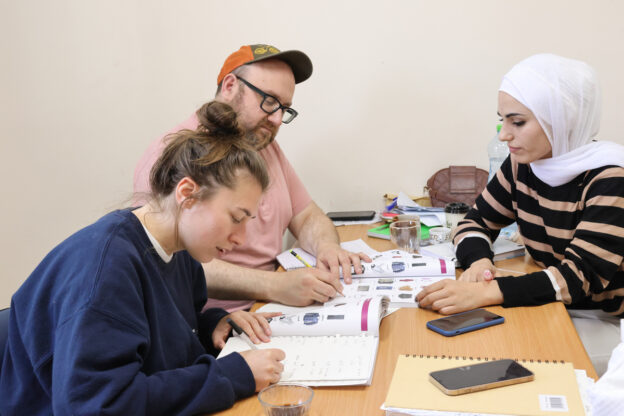Studying Arabic: A Guide to the Shami (Ammiya) Dialect – Arabic is around 2,000 years old, although it has evolved since its origin in the Arabian Peninsula. The Arabic language is only growing in importance, and today it’s the fourth most spoken language around the world, after Chinese, Spanish, and English, with around 362 million native speakers. Additionally, Islam is the fastest-growing religion in the world, and there are currently over two billion Muslims.
This has spread Arabic around the world as it’s the language of the Holy Qur’an and is therefore an essential language for all muslims. Many westerners are also surprised to learn that there are other religions besides Islam in the Arab World, and that many Druze, Christian, and Jewish Arabs also speak Arabic.
Table of Contents
Arabic Is Spoken Across An Important Region
The Middle East and North Africa (MENA) is a critical region, historically, culturally, and economically. Arabic is therefore essential if you wish to work, live, or travel here. Equally, suppose you are interested in the region more generally. In that case, studying Arabic is a great way to learn more about the area, its literature, cultures, and peoples. Learning any new language will always teach you more about your own language when you find the similarities and differences. Additionally, learning Arabic or any other language will give you insight into the mindsets and mannerisms of people who speak the language.
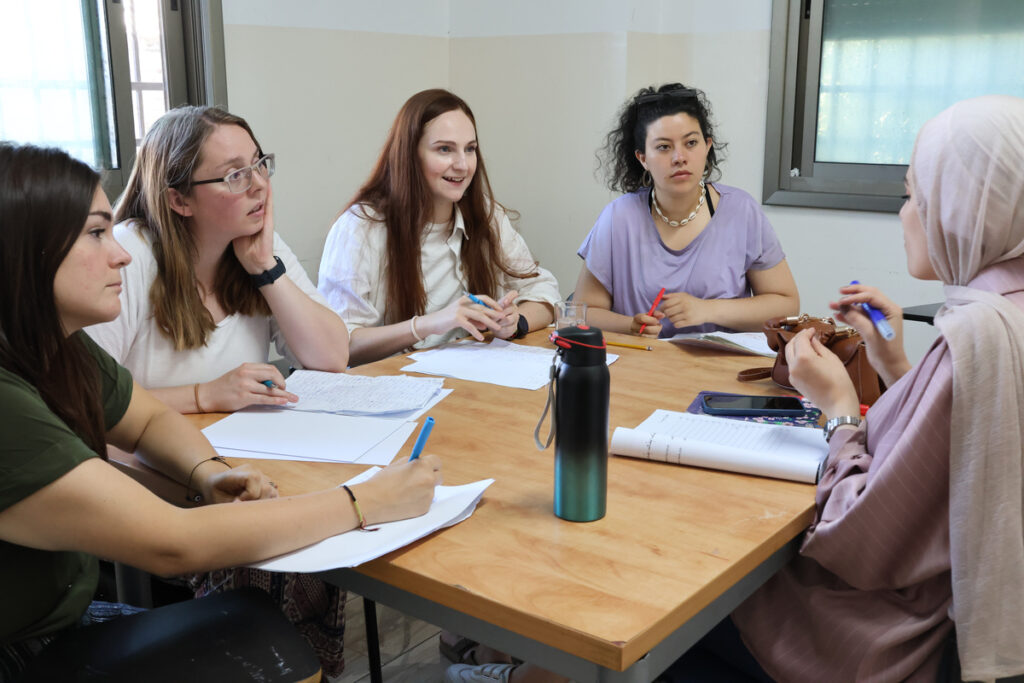
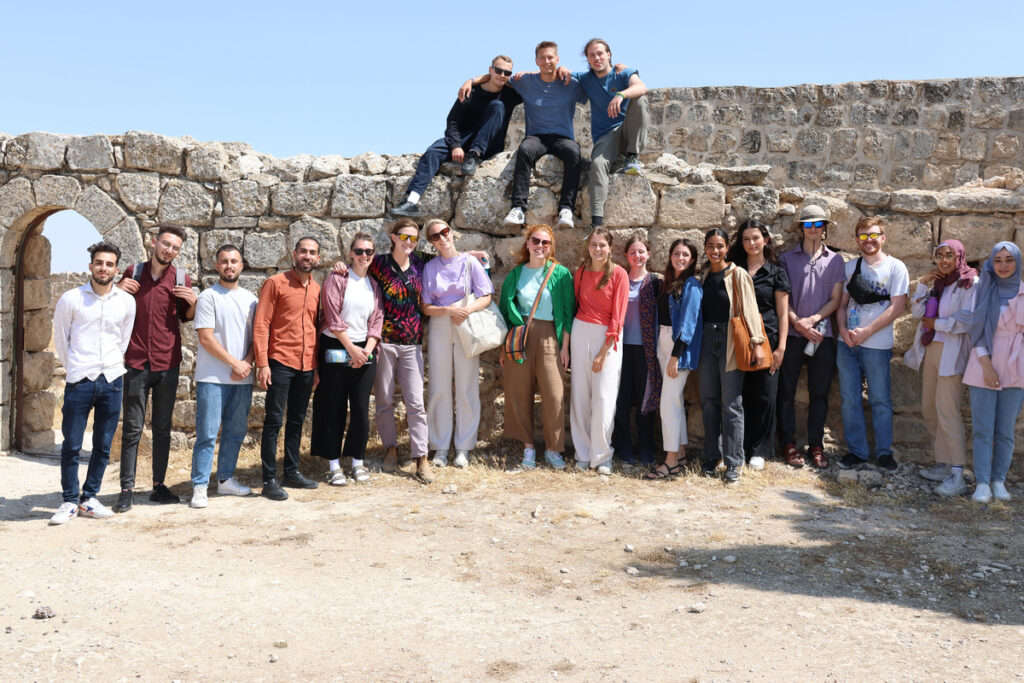
In this guide, we will provide you with tips to help you learn the language quickly and effectively, and also recommend where you can study the language in the Middle East.
But Wait… Which dialect??
Arabic is a fascinating language – did you know that it’s the official language of Algeria, Bahrain, Chad, Comoros, Djibouti, Egypt, Eritrea, Iraq, Jordan, Kuwait, Lebanon, Libya, Mauritania, Morocco, Oman, Palestine, Qatar, Saudi Arabia, Somalia, Sudan, Syria, Tanzania, Tunisia, the United Arab Emirates and Yemen?
Additionally, Western colonization and imperialism have created a large Arab diaspora around the world, with many native Arabic speakers needing to flee their homelands for other non-Arab countries. Because Arabic is so widely spoken, it is made up of many different dialects, with some estimating that there are around 30 modern variants or dialects.
Who Speaks Levantine Arabic?
Levantine Arabic, also known as Shami or Ammiyya Arabic (اللهجة العامية), is spoken by over 40 million people across the Levant region, which includes Syria, Lebanon, Jordan, and Palestine. It is the native dialect of people in major cities such as Damascus, Beirut, Amman, and Jerusalem, as well as in surrounding rural areas and villages.
In addition to native speakers in the Middle East, millions of Levantine Arabic speakers live abroad due to migration, study, work, or displacement. Significant diaspora communities exist in Europe, North America, South America, and the Gulf states. In these communities, Levantine Arabic continues to thrive, often blending with the local languages and cultures.
Despite regional variations in vocabulary and pronunciation, Levantine Arabic remains largely mutually intelligible across its sub-dialects, making it a practical and widely understood form of spoken Arabic in both the Middle East and the diaspora.
Differences Between Levantine Arabic and Modern Standard Arabic
Levantine Arabic and Modern Standard Arabic (MSA) differ significantly in usage, tone, and formality. MSA is a standardized, literary form of Arabic used in formal writing, news broadcasts, education, and official communication across the Arab world. It follows strict grammatical rules and is essentially uniform across different countries. Levantine Arabic, on the other hand, is a colloquial dialect spoken in everyday life in countries such as Syria, Lebanon, Jordan, and Palestine. It is more flexible, fluid, and adapted to informal, conversational use.
One of the most notable differences between the two is pronunciation. In Levantine Arabic, certain consonants are softened or pronounced differently than in MSA. For example, the letter ق (qāf) is often pronounced as a glottal stop [ʔ] in urban Levantine speech, while in MSA, it retains its original deep [q] sound. Similarly, the letter ج (jīm) is often pronounced [ʒ] (like the “s” in “measure”) in Levantine, whereas MSA uses [dʒ] (as in “judge”). These differences in pronunciation give Levantine Arabic a more melodic and casual tone compared to the formal and classical sound of MSA.
Another key distinction lies in vocabulary and grammar. Levantine Arabic frequently incorporates words borrowed from Turkish, French, English, and other regional languages due to historical and cultural influences. It also simplifies many grammatical structures. For instance, the phrase “I want” is expressed as “biddi” in Levantine, while MSA uses the more complex form “urīdu.” Sentence structures in Levantine are often more flexible, allowing for varied word order, whereas MSA adheres more rigidly to formal syntax rules. This informality makes Levantine Arabic more accessible for daily communication, while MSA remains the language of literature, academia, and formal discourse.
Modern Standard Arabic
In most classrooms outside of MENA, students are typically taught Modern Standard Arabic (MSA), a catch-all formal version of the language that may be the most effective way to learn it until you determine which dialect you wish to specialize in. MSA is the formal language used in education, formal speech, literature, and the news. MSA developed from Classical Arabic (the language of the Holy Qur’an), which was also used for Islamic literature between the 7th and 9th centuries.
However, suppose you wish to converse with native Arabic speakers. In that case, it’s best to choose a dialect to specialize in because native Arabic speakers generally don’t speak MSA in their daily lives. They are likely to understand you speaking MSA to them. Still, you will likely not fully understand them when they respond to you in their dialect, which inevitably creates communication barriers.
Local Dialects
Local people in each country or region speak their own variant. The different dialects across the Arab World share many similarities with the Modern Standard format. Still, they will usually have different vocabulary and grammatical structures, some variations in pronunciation, and be spoken in various accents. Even from one city or village to the next, there can be differences.
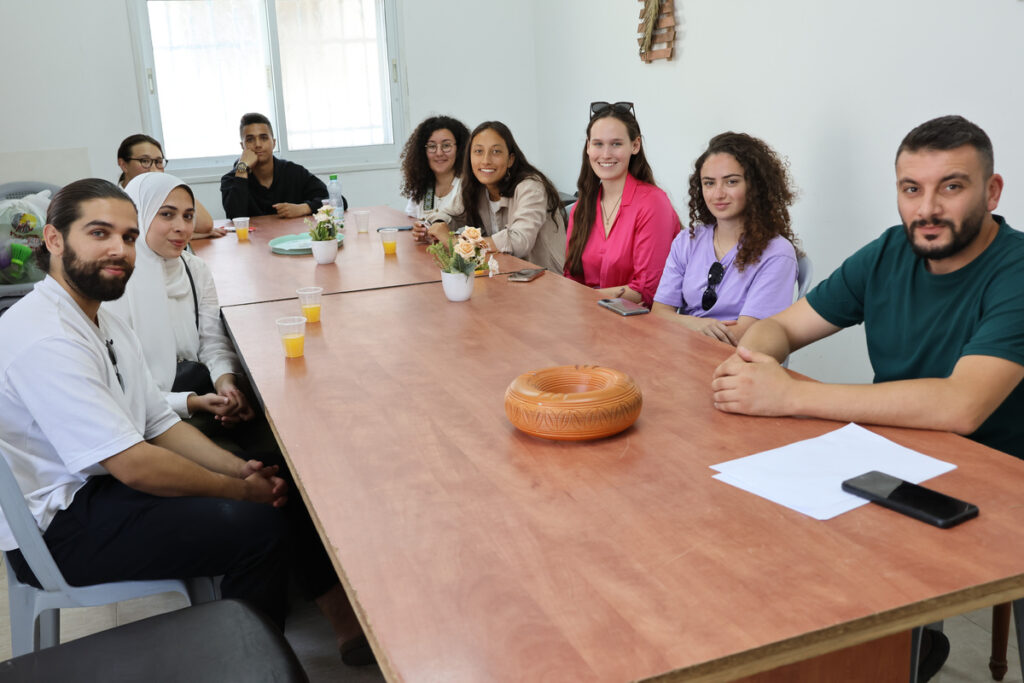
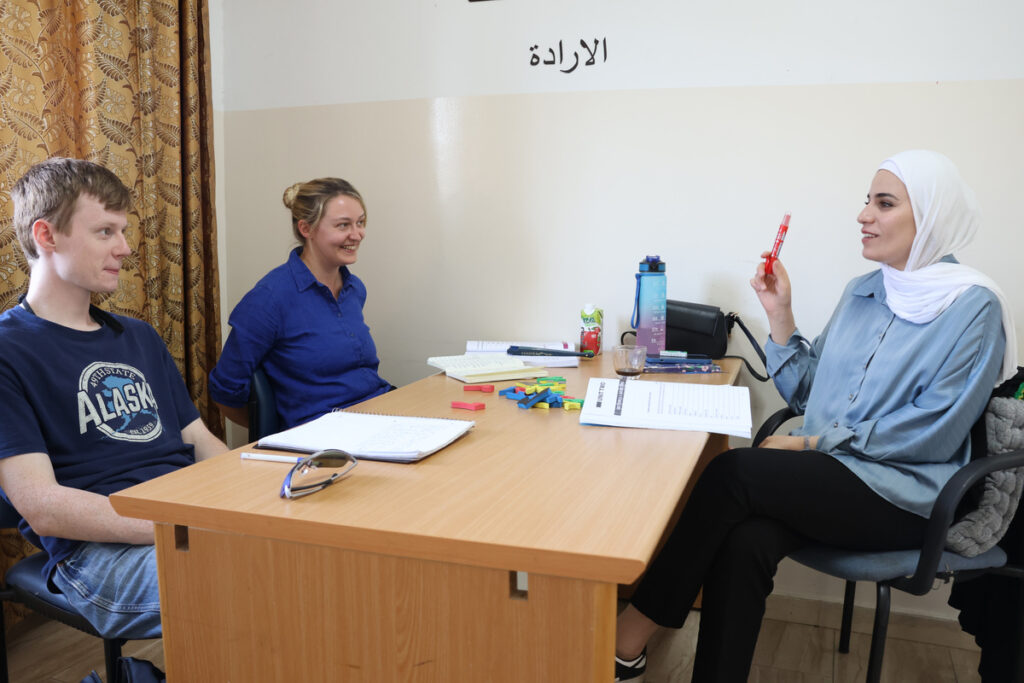
Northern African countries have dialects that differ quite substantially from Middle Eastern Arabic due to the different linguistic influences there. For example, one of the lasting impacts of the French colonization of African countries is the influence on the way Arabic is spoken there, and fusing it with French in some regards.
Khaliji And Shami
The two most popular dialects in the Middle East are Khaliji (Gulf Arabic) and Shami (Levantine Arabic). Khaliji is spoken in the Gulf states, such as the UAE, Kuwait, and Qatar. In contrast, Shami is spoken by all Arabic countries near the Mediterranean Sea: Syria, Lebanon, Palestine, and Jordan.
Critically, most Arabic speakers can understand the Levantine dialect because it’s the most commonly recognized, as it’s the closest to Modern Standard Arabic. In contrast, other dialects may be less likely to be understood by an outsider. This makes learning Levantine Arabic an excellent choice for those considering which dialect to learn.
So Which Dialect Should You Choose and How to Approach That?
Before you begin learning Arabic, first decide which type to learn – MSA or a local dialect. There is an abundance of MSA classes and study materials available, making it accessible to learn, but not necessarily useful, depending on what your goals are. Decide what your goals are and what you wish to do with Arabic, and then you can decide which type is best for you.
Keep reading to find some tips to help you learn once you have decided which Arabic dialect to learn.
Should You Learn The Arabic Alphabet?
Some people find learning the Arabic alphabet too challenging, so they opt for Arabizi, a blend of “3arabi” and “Inglizi” (“Arabic” and “English” in Arabic, respectively). This involves using the Latin alphabet and numbers to represent sounds that are not found in English. For example, the name “Mohammed” can be written as “M7md” in Arabizi.
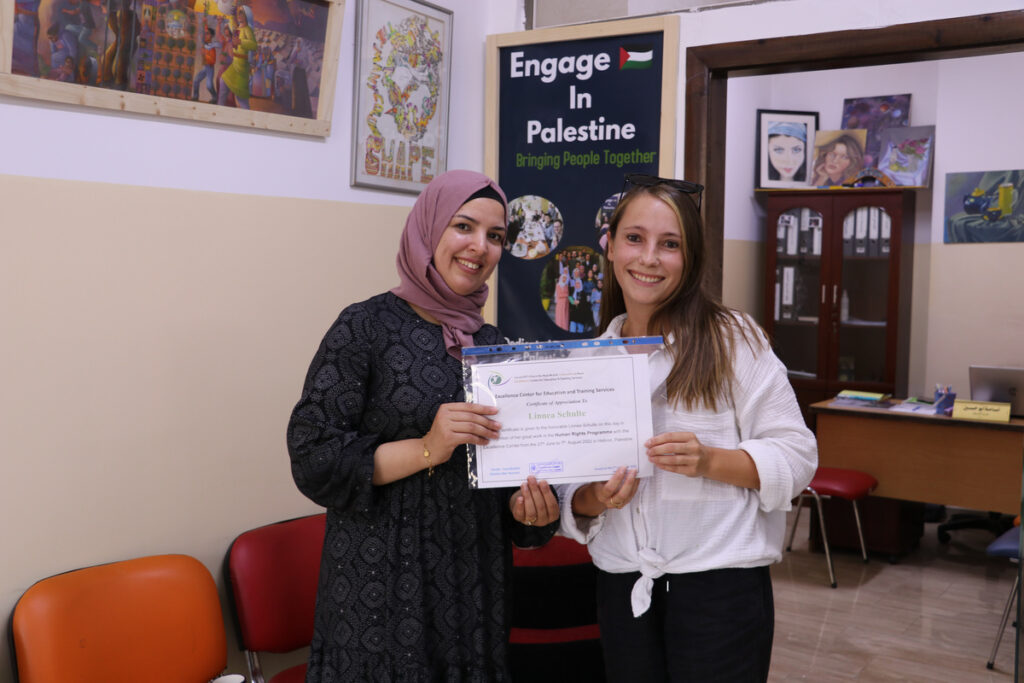
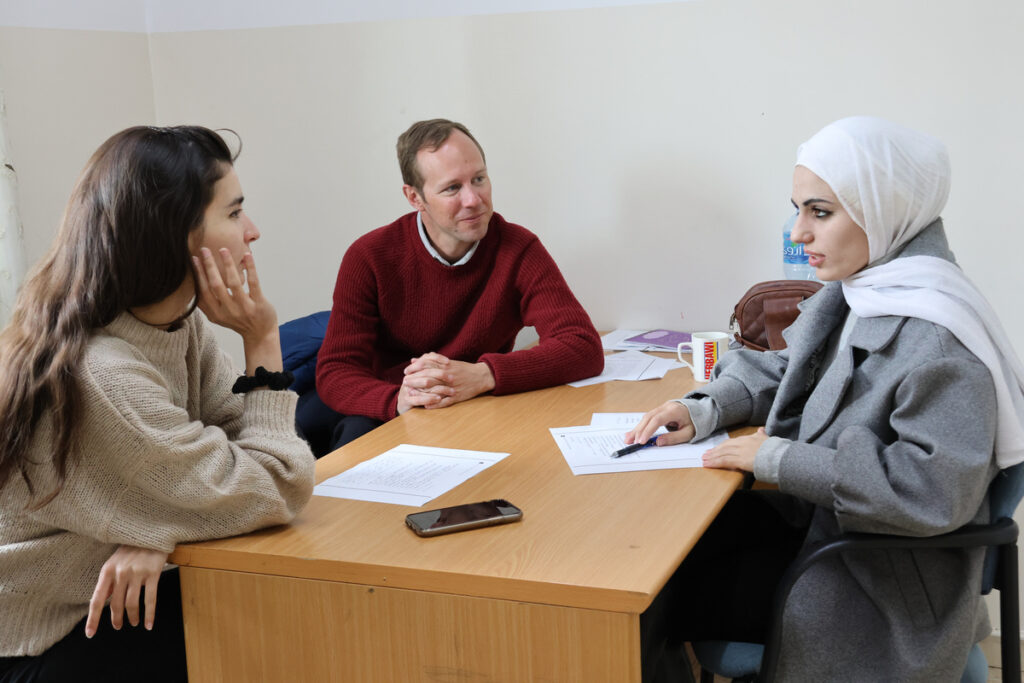
However, if you do not learn the Arabic alphabet, you will not be able to read and write, and you will therefore have difficulty learning new words on your own. Learning the Arabic alphabet will also help improve your pronunciation, as using the English alphabet or Arabizi often gives inaccurate pronunciation.
Watch Arabic TV And Films
The more you immerse yourself in Arabic culture, the quicker you will pick up and enjoy the language. There are many Arabic films and series on Netflix. You could also ask an Arab friend for recommendations of series and movies to watch. You can then use subtitles to build your understanding of the show.
Speak Native!
One of the best pieces of advice when learning any language is to find a native speaker to practice with. If they can speak your language, they will be able to explain everything to you more easily and give you recommendations for articles, films, or websites to improve your Arabic. They can also teach you the quirks of their dialect much better than a non-native speaker. If you make friends with an Arabic speaker, you can improve your Arabic informally by practicing conversations about various topics with them.
List of Shami (Ammiya) Dialect Intensive Programs
Here you can check out which Levantine Arabic programs the Excellence Center in Palestine offers:
1. Intensive Palestinian Arabic Program
Intensive Palestinian Arabic Program: Study Palestinian Arabic School offers a variety of courses in Palestinian Arabic. These include intensive Palestinian Arabic courses, winter Arabic programs, summer Arabic programs, and online Palestinian Arabic programs. This is a unique opportunity for individuals who wish to learn the colloquial Palestinian dialect of Arabic (Ammiya or Levantine dialect), connect with the broader Palestinian diaspora, and immerse themselves in the vibrant culture of Palestine and the Levant region.
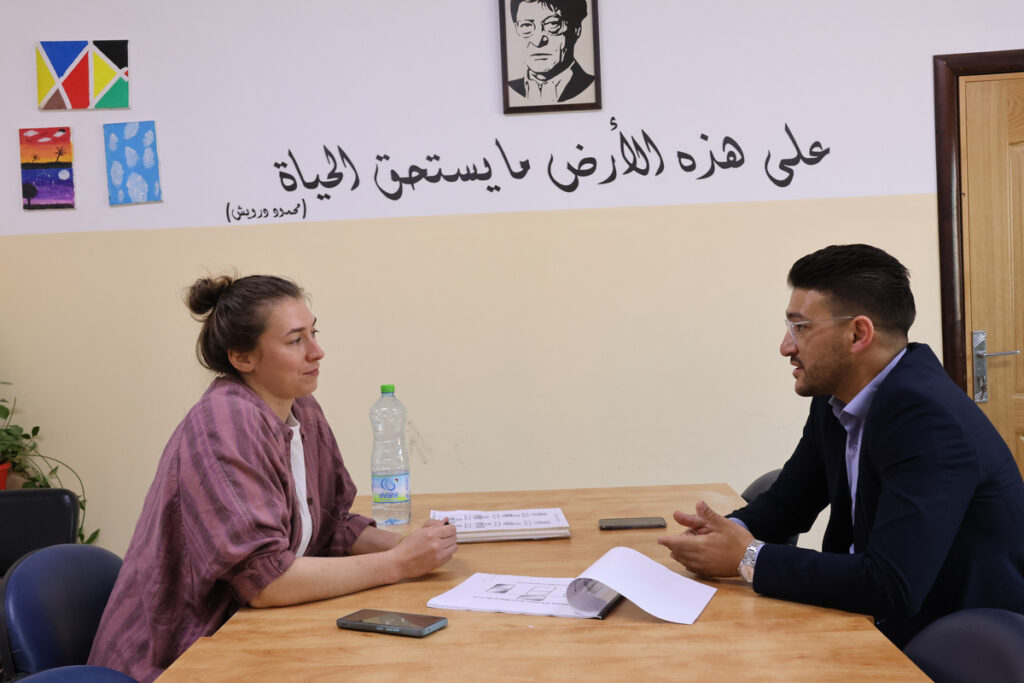
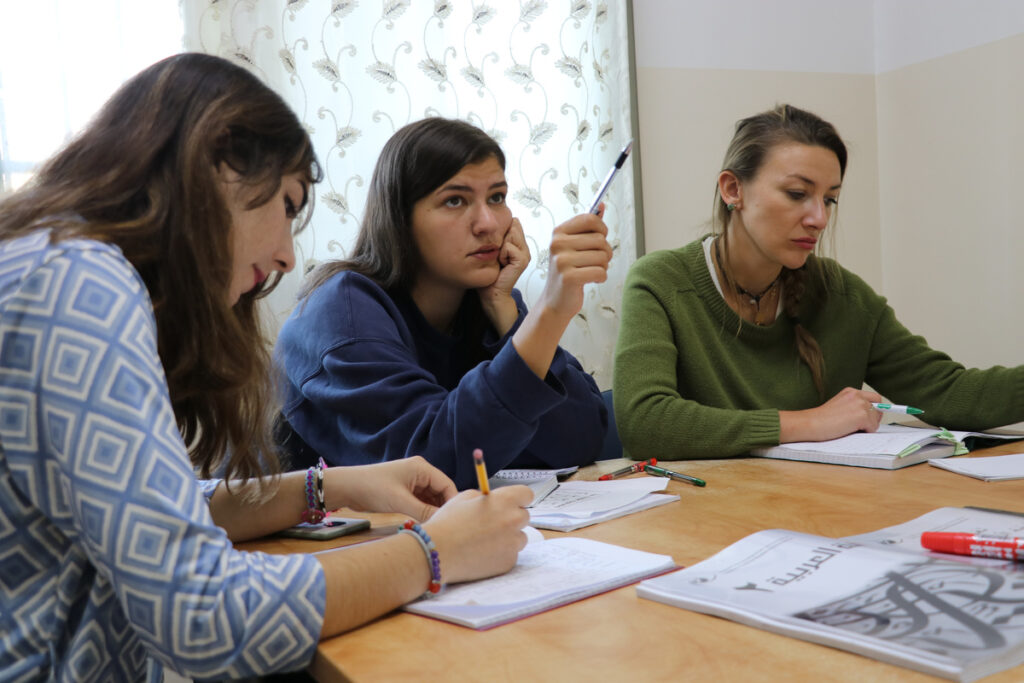
These lessons include Intensive Palestinian Arabic Courses, Summer and Winter Palestinian Arabic Programs, and Online Palestinian Arabic Lessons. Students have the chance to study 20 hours of instruction per week. With this format, students can quickly acquire Arabic skills and complete a full 80-hour course in just four weeks.
2. Winter Palestinian Arabic Program
Winter Palestinian Arabic Program: Explore our Arabic Winter Immersion Course in Palestine at Study Palestinian Arabic School, located in Hebron, West Bank. We offer courses in Palestinian Arabic Ammiya dialect, Levantine (Shami Arabic), and Modern Standard Arabic. Lying in the heart of the Levant, the West Bank is a captivating destination to explore the language’s rich history and culture.
Our Winter Immersion Course in Palestine is designed to enhance your Arabic language skills through interactive lessons led by experienced Palestinian instructors. Outside of the classroom, you’ll have the chance to practice your language skills in authentic settings, engaging with local Palestinians and participating in cultural activities.
3. Summer Arabic Immersion Program in Palestine
Summer Arabic Program: The Arabic Summer Immersion Program is an excellent opportunity for those seeking an intensive Arabic course during the summer in the West Bank, Palestine, Jordan, Lebanon, Syria, Israel, or the broader Middle East region. Recognized as one of the top Arabic language schools in Palestine, our Study Palestinian Arabic School offers enriching summer Palestinian Arabic courses suitable for all learners.
Whatever your reason, if you’re interested in learning Levantine Arabic (Shami dialect), our Summer Palestinian Arabic Immersion Program is for you. With options for super-intensive and intensive immersion summer programs in dialects such as Levantine (Ammiya), Palestinian colloquial Arabic, and Modern Standard Arabic, Study Palestinian Arabic School welcomes all guests seeking to learn this beautiful language. Our students include undergraduates, graduates, professionals, and even retirees with abilities ranging from beginner to advanced.
4. Intensive Jordanian Arabic Program
Our Intensive Jordanian Arabic Program in Amman, Jordan, is designed to accelerate your language learning through complete cultural and linguistic immersion. We offer year-round courses in Jordanian and Levantine Colloquial Arabic (Ammiyya), as well as Modern Standard Arabic (MSA). Online lessons are also available for those seeking more flexibility. For a more customized experience, we provide personalized courses tailored to your specific learning goals.
Our courses offer flexibility in both duration and timing, running from one to thirteen weeks and available year-round—spring, summer, fall, and winter. Whether you’re looking for a short, intensive Arabic program in Amman or elsewhere in the Middle East, or prefer a more extended stay to immerse yourself in the language and culture, we’re here to help you find the experience that fits your goals.
5. Summer Intensive Jordanian Arabic Program
Summer Intensive Jordanian Arabic in Amman provides an excellent opportunity for those interested in deepening their proficiency in Levantine Arabic or Ammiyya Arabic (اللهجة الشامية او العامية), spoken across a variety of regions, including Palestine, Jordan, Lebanon, Syria, and the broader Middle East. Recognized as one of the leading Arabic language schools in Jordan, we are committed to delivering high-quality, culturally immersive Arabic education.
Our Summer Intensive Arabic program provides a range of study options for Arabic dialects tailored to different goals and proficiency levels. Choose from intensive or super-intensive courses in Levantine (Ammiya), Jordanian colloquial Arabic, or Modern Standard Arabic (MSA), and gain language skills in a dynamic, supportive environment rooted in an authentic regional context.
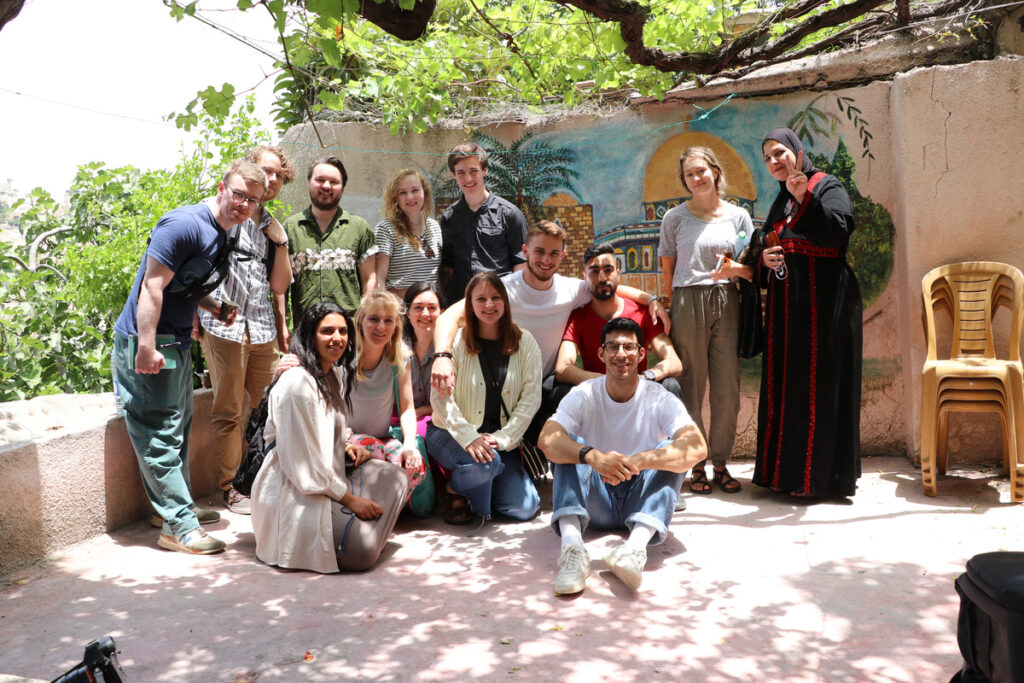
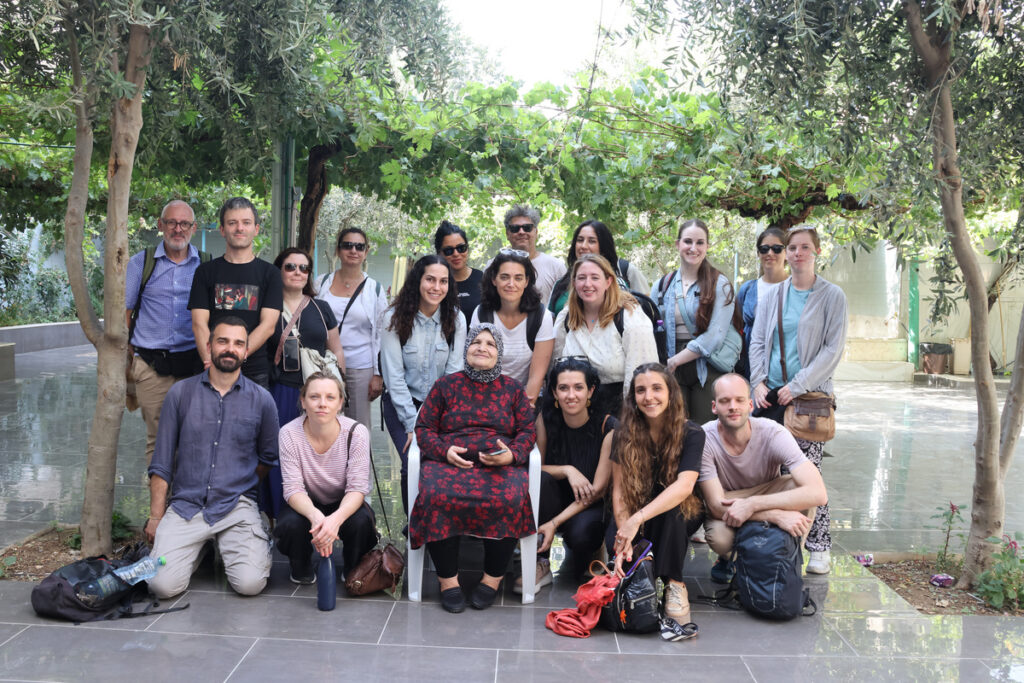
6. Winter Jordanian Arabic Program
Winter Jordanian Arabic Program offers an exceptional opportunity for learners looking to deepen their proficiency in Levantine or Ammiyya Arabic (اللهجة الشامية او العامية), spoken across regions such as Palestine, Jordan, Lebanon, Syria, and the broader Middle East. As one of Jordan’s leading Arabic language schools, we are dedicated to providing high-quality instruction grounded in cultural immersion and meaningful community engagement.
Studying Arabic in Jordan during the winter offers a unique and enriching experience. You’ll explore the vibrant culture of Amman, enjoy the renowned warmth of Jordanian hospitality, and form lasting connections with the local community. Jordanians are known for their friendliness and generosity, creating an environment where students feel welcomed and encouraged to engage with the language and culture every day.
7. Intensive Syrian Arabic Program
Intensive Syrian Arabic Program in Damascus, at Study Syrian Arabic School offers a unique chance to learn the Syrian dialect through full immersion in Damascus. As one of the most widely spoken Arabic dialects, mastering Syrian Arabic provides access not only to Syria but to much of the Arabic-speaking world.
Courses emphasize colloquial language and practical communication, helping students quickly gain real-world proficiency. In addition to reading and listening skills, students learn to speak and write using Syrian phonetics. All levels are available, with topics focused on daily life in Damascus. Students can also stay with host families for deeper cultural immersion.
8. Syrian Summer Arabic Program
Syrian Summer Arabic Program in Damascus offers a unique opportunity to immerse yourself in the Levantine (Shami) dialect, Syrian colloquial Arabic, or Modern Standard Arabic (MSA) while experiencing the rich cultural and historical landscape of Syria. Hosted in Damascus, one of the oldest continuously inhabited cities in the world, this program is ideal for learners at all levels, from complete beginners to advanced students.
Whether you’re a university student, professional, or retiree, you’ll find a welcoming and supportive environment at Study Syrian Arabic School. Our experienced instructors and immersive curriculum ensure that your summer in Syria is both academically enriching and personally transformative.
9. Winter Syrian Arabic Program
The Winter Syrian Arabic Program in Damascus offers a rich opportunity to study Arabic in the heart of the Levant—Damascus, Syria. Whether you’re a complete beginner or an advanced learner, this immersive program is designed to help you develop fluency in Syrian Colloquial Arabic, Levantine (Shami) Arabic, or Modern Standard Arabic (MSA) while experiencing the warmth of Syrian hospitality and the depth of its cultural heritage.
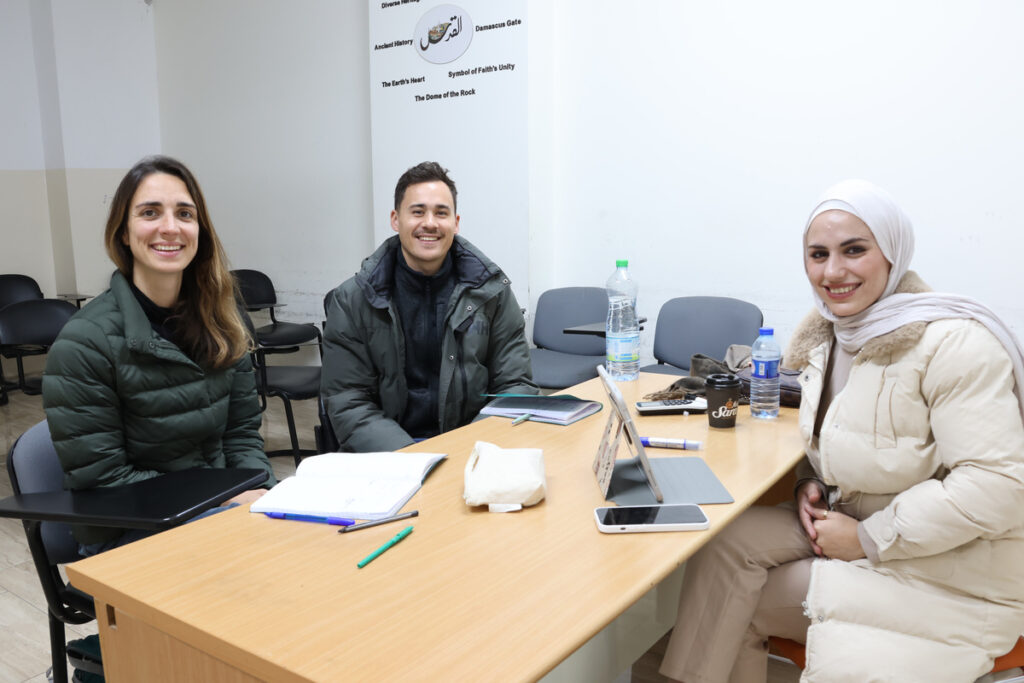
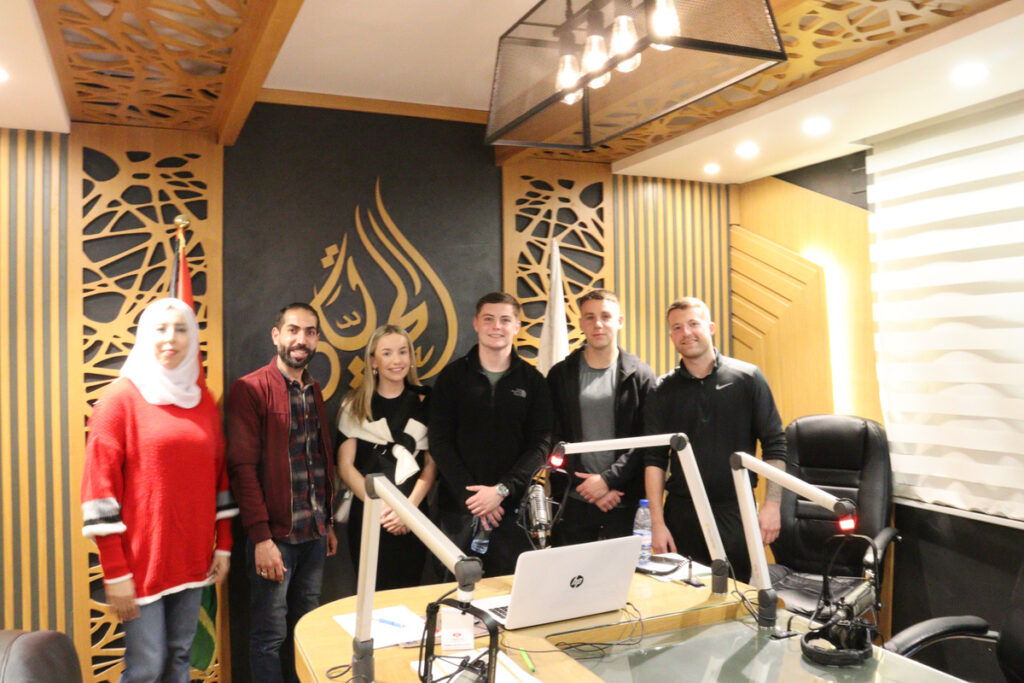
Running throughout December, January, and February, the program is ideal for students, professionals, and lifelong learners seeking a meaningful winter experience that combines language learning with cultural exploration. With small class sizes, experienced instructors, and cultural experiences that extend beyond the classroom, our Winter Immersion Course in Syria offers a fulfilling experience that goes beyond the textbooks.
Study Arabic With the Excellence Center in Palestine
The Excellence Center in Palestine is an excellent place to study Arabic, combining dedicated courses with immersion in the local learning environment. We offer intensive Arabic courses, involving up to five hours of classes per day plus homework, which will rapidly build your language level in the minimal possible time. Alternatively, suppose you want more time to explore Palestine and its culture. In that case, you can enroll in a volunteer program, where you will volunteer and receive several hours of Arabic lessons a week.
Whichever program you choose, you will spend much of your time at the Excellence Center in Palestine’s center with the permanent Palestinian staff who can help you with your Arabic, practicing and correcting your mistakes, even outside of lesson time. The Excellence Center in Palestine is based in Hebron, the biggest city in the West Bank, Palestine. There are many interesting things to do here, and there are great opportunities to continue your Arabic development through meeting and befriending locals who are eager to help people speak their language. Many of them speak English as well, which helps with the translation and the language learning process.
Students and volunteers can make many Arabic friends and contacts in Hebron, who will help them continue practicing their Arabic even after leaving the country. Whether it’s through WhatsApp conversations or phone calls, they can practice reading, writing, speaking, and listening to Arabic even once they’re back in their home country.
If you cannot join us in person, we also offer online lessons.
Summer Programs To Study Arabic
If you are looking to study Arabic in Palestine or the Middle East in summer, the Excellence Center in Palestine offers intensive small-group one-month courses during the summer months (June through September) that begin on the first day of each month. Typically, there are 2-5 students in each small group. You may choose whether you wish to study Modern Standard Arabic, Levantine, or Colloquial Palestinian Arabic. E
ach type of Arabic is offered in several different levels, from total beginner to advanced. You may also choose whether you wish to study with us for one month, two months, or three months. Studying with us in the summer is an excellent opportunity for students or anyone else with an extended break during the summer.
The Benefits Of Studying Arabic the Excellence Center in Palestine
We offer the choice between colloquial Palestinian Arabic and MSA. Our courses offer high flexibility, allowing you to choose between a super-intensive, intensive, or non-intensive course. You also have the freedom to select the course length (1-13 weeks) and the start and end dates. When you study one-on-one with one of our excellent teachers, you will also be able to tailor your lessons to your own needs and interests.
As part of your Arabic course, we provide all learning materials, accommodation, daily breakfast, and occasional dinners. Also included are organized trips to the sights of Hebron, like the famous Ibrahim Mosque, the glass factory, and the kuffiyeh factory, along with local organizations of political or cultural significance. You will also have at least two days off per week to explore the fascinating nearby cities such as Jerusalem, Ramallah, Bethlehem, Nablus, Jericho, and the Dead Sea, either by yourself or with the new friends that you will undoubtedly make here.
Reviews and Awards
A Guide to the Shami (Ammiya) Dialect – Summary
Arabic is the fourth most spoken language in the world, and not only is it a rich and beautiful language, but it’s also growing in importance due to globalization. There are many different dialects of Arabic to choose from. Still, we recommend learning the Levantine dialect because it’s one of the most widely spoken and understood dialects, being the closest to Modern Standard Arabic. Here we have provided you with several tips to help you learn Arabic.
However, we think the best way to learn Arabic is to come and study it with us, immerse yourself in our language and our Palestinian culture, while also making memories to last a lifetime. Many international students and volunteers join us, so you will have the chance to make friends with Palestinians as well as people from all over the world.
When you study with us, you will not only be taught by one of our outstanding native Arabic-speaking teachers, but you will also have a flexible course, where you can choose the length, the intensity, and the start and end dates. In addition to an immersion in Arabic and Palestinian culture, we also include accommodation, daily breakfast, and several visits around Hebron city to help you learn more about Palestine politically and culturally.
We hope to hear from you and meet you in Palestine soon!
Contact Us
Tags: Beginner Levantine (Ammiya) Arabic, Learn Shami Arabic dialect online, Online Shami Arabic Lessons, Study spoken Levantine Arabic for beginners
